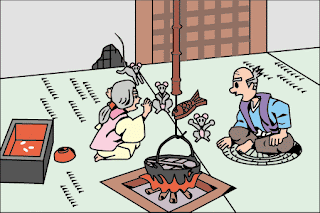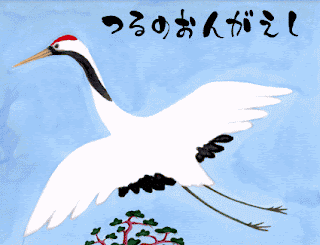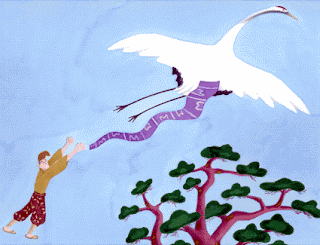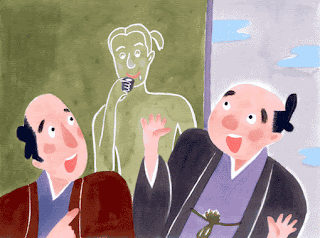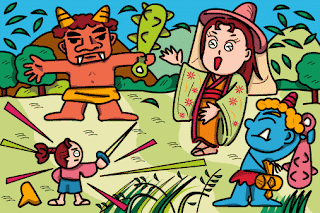Once upon a time in a remote mountain village in Japan there lived an honest old man and his wife. The old man was out plowing his field one day when a little white puppy came fleeing toward him, crying. The puppy had been mistreated by the greedy old man who lived in the next field over. "Oh, you poor thing." exclaimed the old man, and taking him in, gave the puppy the name "Shiro." ("Shiro" in Japanese means white)
The old man and his wife loved Shiro very much. Shiro, in turn, became devoted to the old couple, and helped the old man with his work in the field every day. Shiro ate and ate, and quickly grew into a big dog.
One day, Shiro led the old man up a nearby mountain. When they reached the top, Shiro barked, "Arf Arf - Dig here! Arf Arf - Dig here!" As the old man began to dig, to his amazement, sparkling gold coins started pouring up from the ground.
"Let me borrow Shiro!" The greedy old man heard about this and, grabbing Shiro, forced him to take he and his wife to the mountain. "Where's the gold?" the old man demanded. Frightened, Shiro began to whimper. "Ah, so it's here," said the old man, and he began to dig. But instead of gold coins, garbage began pouring up from the ground. "How dare you!" exclaimed the old man. Furious, they killed Shiro.
"Shiro liked steamed rice cakes," recalled the old man. "Let's make some to take to his grave." He chopped down the tree that had sprung from Shiro's grave and made a mortar. Then he and his wife began to prepare the rice cakes. As the old man pounded the rice into the mortar, it began to turn into gold coins.
Upon seeing this, the greedy old couple rushed over. "Give us that mortar." Stealing the mortar, they returned to their house and began to make rice cakes. When they pounded rice, however, it turned into black mud right before their eyes. "What on earth?" cried the old man. Furious, he took an axe and chopped the mortar to pieces. Then he tossed the pieces of wood into the stove and burned them. The honest old man was disheartened. He gathered up the ashes from the mortar, put them in a box, and carried the box carefully back to his house.
"Let's sprinkle these ashes over the field and grow the radish that Shiro loved so much." When the old man sprinkled the ashes, a wind swirled up and blew the ashes into a dead tree. Amazingly, the dead tree began to bloom beautiful cherry blossoms. He then went and happily sprinkled ashes onto one dead tree after another, each which thereafter bloomed brilliant cherry flowers. News of the old man's miracle reached the town and before long, even the ears of the king, who promptly sent for the old man.
The old man was brought to the king, carrying his box of ashes. "Now I'll make the flowers bloom." He sprinkled the ashes onto the nearby trees, and immediately, beautiful white cherry flowers appeared.
"Splendid!" exclaimed the king, who was very pleased. "Well done. You are the greatest flower bloomer in all of Japan. You will be rewarded."
At that moment, the greedy old man came running, carrying the leftover ashes which he had gathered from the stove. "Wait! I'm the greatest flower bloomer in Japan." With that, he began to sprinkle his ashes. Instead of landing on the flowers, however, the ash flew into the eyes and nose of the king, choking him. "You impudent!" the king stormed, and promptly threw the greedy old man into prison.
origin:http://web-japan.org/kidsweb/folk/hanasaka/index.html
The old man was brought to the king, carrying his box of ashes. "Now I'll make the flowers bloom." He sprinkled the ashes onto the nearby trees, and immediately, beautiful white cherry flowers appeared.
"Splendid!" exclaimed the king, who was very pleased. "Well done. You are the greatest flower bloomer in all of Japan. You will be rewarded."
At that moment, the greedy old man came running, carrying the leftover ashes which he had gathered from the stove. "Wait! I'm the greatest flower bloomer in Japan." With that, he began to sprinkle his ashes. Instead of landing on the flowers, however, the ash flew into the eyes and nose of the king, choking him. "You impudent!" the king stormed, and promptly threw the greedy old man into prison.
origin:http://web-japan.org/kidsweb/folk/hanasaka/index.html
Read more...







